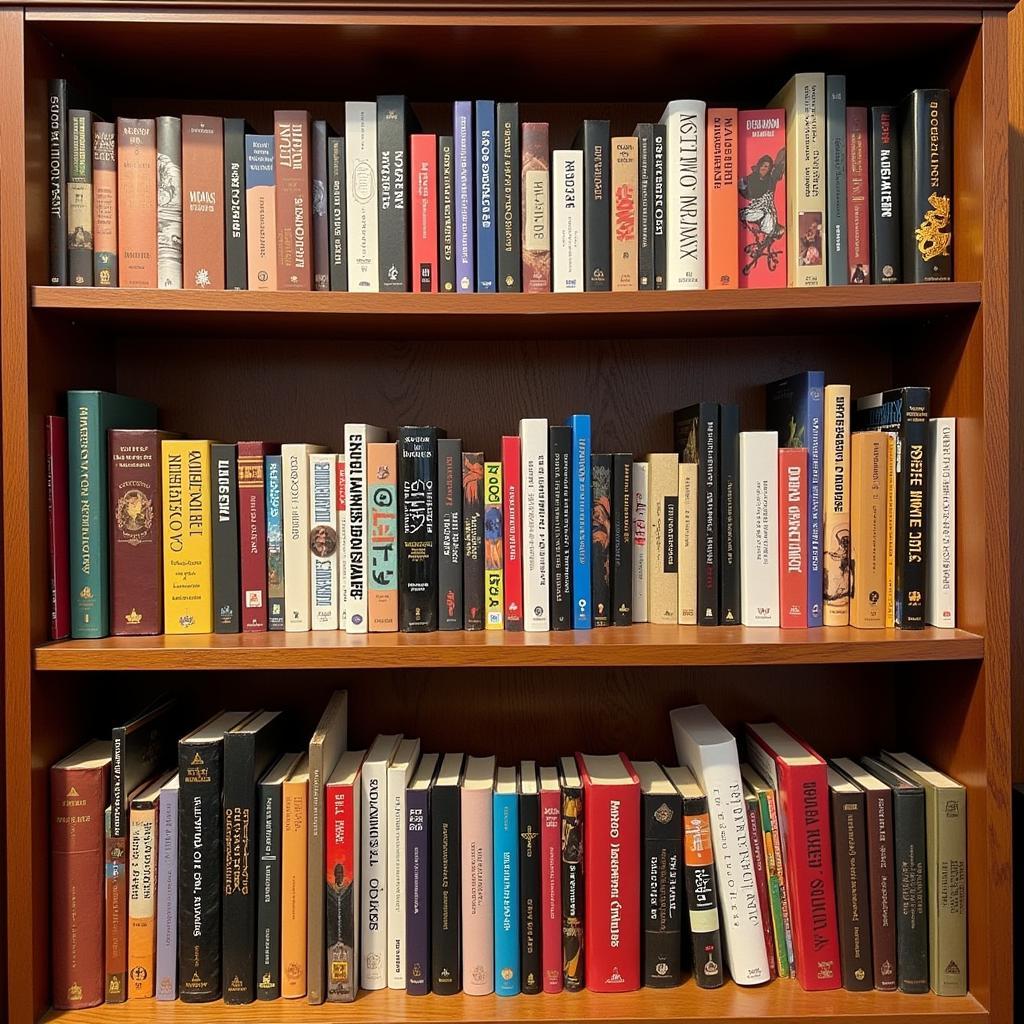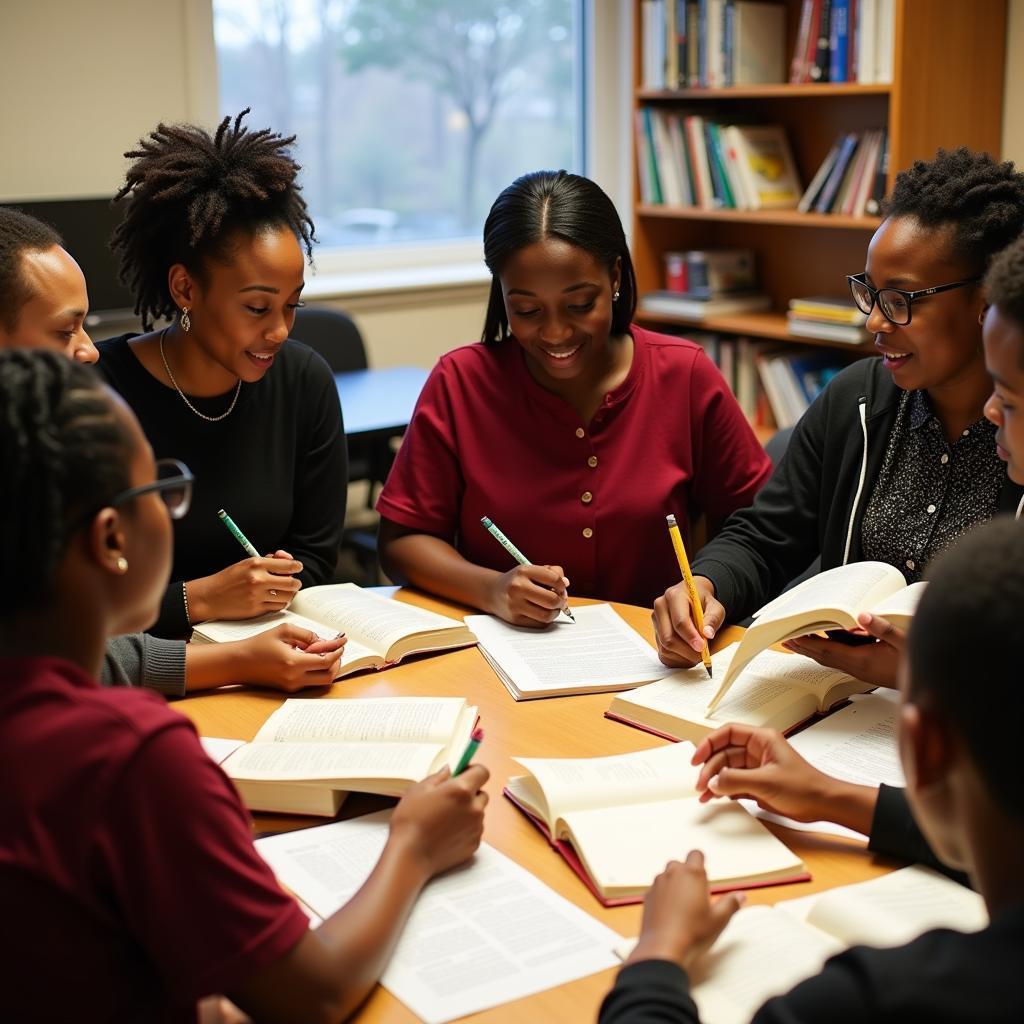20th Century African American Literature Syllabus: Exploring Literary Legacy
The 20th century witnessed a flowering of African American literature, giving rise to groundbreaking works that reshaped American literary and cultural landscapes. A “20th Century African American Literature Syllabus” provides a structured exploration of this significant period, delving into themes of race, identity, social justice, and the African American experience.
 Students engaging in a discussion about 20th-century African American literature
Students engaging in a discussion about 20th-century African American literature
Key Themes and Movements
A comprehensive syllabus typically encompasses major literary movements and their impact on 20th-century African American writing.
The Harlem Renaissance (1920s-1930s)
This transformative period marked a cultural explosion in Harlem, New York City. The syllabus would likely include iconic figures like Langston Hughes, Zora Neale Hurston, and Claude McKay, examining their contributions to poetry, fiction, and drama.
The Black Arts Movement (1960s-1970s)
Emerging alongside the Civil Rights Movement, the Black Arts Movement emphasized Black pride, self-determination, and revolutionary art. Writers like Amiri Baraka, Sonia Sanchez, and Nikki Giovanni, with their powerful voices, often find a place in the syllabus.
Post-Blackness and Beyond (Late 20th Century)
The syllabus might delve into the complexities of “post-Blackness,” a literary concept that challenges monolithic notions of Black identity and experience. Writers such as Toni Morrison, Alice Walker, and August Wilson, who explored diverse themes and styles, exemplify this era.
 A curated selection of books by African American authors
A curated selection of books by African American authors
Essential Authors and Texts
A “20th century African American literature syllabus” wouldn’t be complete without a carefully curated selection of essential readings:
- Zora Neale Hurston’s Their Eyes Were Watching God (1937): A cornerstone of the Harlem Renaissance, this novel celebrates Black Southern life and language, exploring themes of love, self-discovery, and female agency.
- Richard Wright’s Native Son (1940): A searing portrayal of racial injustice and social alienation in 1930s Chicago, this novel exposed the brutal realities of racism’s impact on individuals and society.
- Ralph Ellison’s Invisible Man (1952): This iconic novel delves into the complexities of Black identity in a racially charged America, exploring themes of invisibility, alienation, and the search for self-definition.
- James Baldwin’s Go Tell It on the Mountain (1953): A semi-autobiographical novel that explores themes of faith, family, and sexuality within the context of the Black church and the Harlem Renaissance.
- Toni Morrison’s Beloved (1987): A hauntingly beautiful and emotionally powerful novel that confronts the legacy of slavery in America, delving into themes of trauma, memory, and the enduring impact of the past.
[For further exploration of African American literature, you can check out our resources on african american literature syllabus and [a history of south african literature](https://omenkamag.com/a history-of-south-african-literature/).]
Analyzing Literary Techniques and Styles
Beyond understanding the historical and social contexts, a good syllabus encourages students to analyze the literary techniques and styles employed by these authors:
- The Use of Vernacular: How do writers like Hurston and Hughes incorporate Black vernacular English into their work to authentically represent characters and experiences?
- Symbolism and Metaphor: How do authors use symbolism and metaphor to convey deeper meanings and explore complex themes related to race, identity, and social justice?
- Narrative Structure: How do authors experiment with narrative structure to challenge traditional forms and perspectives?
 A group of students deeply engrossed in analyzing literary works
A group of students deeply engrossed in analyzing literary works
The Legacy of 20th Century African American Literature
A “20th century African American literature syllabus” not only introduces students to significant literary works but also prompts critical thinking about their lasting impact.
Dr. Anika Johnson, Professor of African American Literature at Howard University, emphasizes, “These works are not confined to the 20th century. They continue to resonate today, sparking crucial conversations about race, equality, and social justice.”
Conclusion
Exploring 20th century African American literature is an enriching journey through pivotal moments in history and culture. A well-structured syllabus provides a roadmap for this exploration, equipping students with the knowledge and analytical tools to appreciate the power, beauty, and enduring relevance of these literary works.
For further insights into historical contexts, consider exploring our syllabus on 20th century african american history syllabus.




